英语时态—一般将来时
时态详解:一般将来时
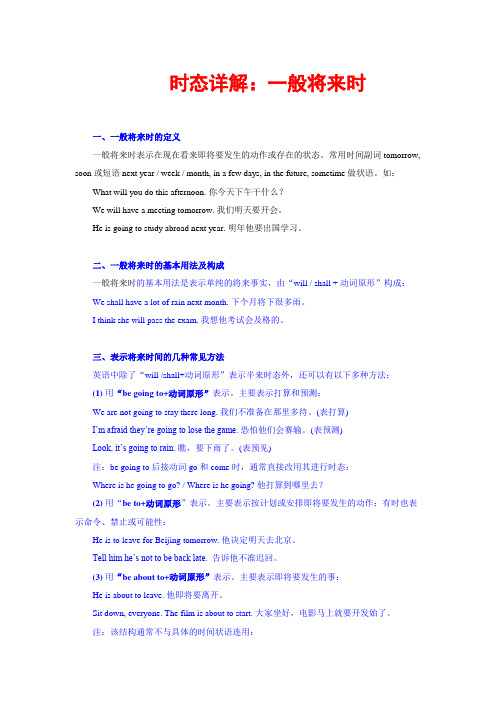
时态详解:一般将来时一、一般将来时的定义一般将来时表示在现在看来即将要发生的动作或存在的状态。
常用时间副词tomorrow, soon或短语next year / week / month, in a few days, in the future, sometime 做状语。
如:What will you do this afternoon. 你今天下午干什么?We will have a meeting tomorrow. 我们明天要开会。
He is going to study abroad next year. 明年他要出国学习。
二、一般将来时的基本用法及构成一般将来时的基本用法是表示单纯的将来事实,由“will / shall + 动词原形”构成:We shall have a lot of rain next month. 下个月将下很多雨。
I think she will pass the exam. 我想他考试会及格的。
三、表示将来时间的几种常见方法英语中除了“will /shall+动词原形”表示半来时态外,还可以有以下多种方法:(1)用“be going to+动词原形”表示。
主要表示打算和预测:We are not going to stay there long. 我们不准备在那里多待。
(表打算)I’m afraid they’re going to lose the game.恐怕他们会赛输。
(表预测)Look, it’s going to rain.瞧,要下雨了。
(表预见)注:be going to 后接动词go和come时,通常直接改用其进行时态:Where is he going to go? / Where is he going? 他打算到哪里去?(2)用“be to+动词原形”表示。
主要表示按计划或安排即将要发生的动作;有时也表示命令、禁止或可能性:He is to leave for Beijing tomorrow. 他决定明天去北京。
英语时态一般将来时

Round 4
Round 4 暴躁胖虎爱说“不” (帮暴躁的胖虎将句子变成否定句哦!)
I am going to do my homework this evening.
not
暴躁胖虎爱说“不”
We are going to stay at home this weekend. not
暴躁胖虎爱说“不”
Round 5
一般将来时的特殊疑问句
特殊疑问词+一般疑问句
1. I am going to climb a mountain this weekend. What are you going to do this weekend?
next day
next year
every day
soon
last week
in the future
Round 1
+ 主语
be going to
+ 动词原形
一
般 将I
am going to
play football.
来
时 You
are going to
buy some food.
结
构 She
is going to
eat some fruit.
Round 2
Round 2
主 语
be
动 going 词 to
Round 2
主 语
be 动
going
词
to
Round 2
主 语
be
动 going 词 to
Round 2
主 语
be
动 going 词 to
Round 2
Round 3
英语语法—一般将来时态
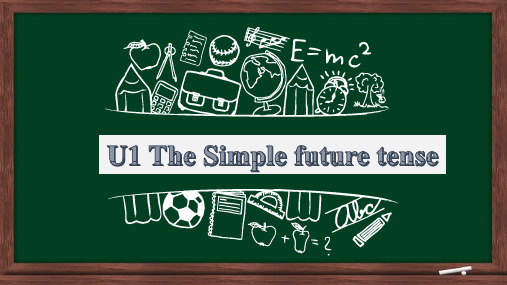
eg. My uncle is coming to see me tomorrow.
五、一般将来时特殊句式
1. There be 句式的一般将来时
Eg. There will be +其他 There is going to be+其他
2. 客观事实用一般现在
情态动词 (1)can/could:能够 could逾期 更委婉 (2)May/might 许可,准许 (3)Should 应该 主观义务
Have to 必须、不得不 (4)Must 主观必须,Must...?Yes,you must/no,you needn’t
Mustn’t 禁止 (5)Need 需要 Need...?Yes,you must/no,you needn’t
三、一般将来时 时间状语
Tomorrow、 Next week/month/year、 in+时间段、 this evening、 in the near future
四、一般将来时例句
1. 表示将来某个时间要发生的事 情或存在的状态。
eg.We will clean the room next week.
一、一般将来时用法(4)
1. 表示将来某个时间要发生的事 情或存在的状态。
3.条件、时间状语从句中,用一般 现在时表将来。
2. be going to 表示将要发生 或者打算、计划要做的事情,或者 可能发生的事情
4.go、come、leave、start等进行 时态表将来。
二、一般将来时结构 1. will / shall + 动词原形
Will / Shall +主语 + 动原 ?
一般将来时态
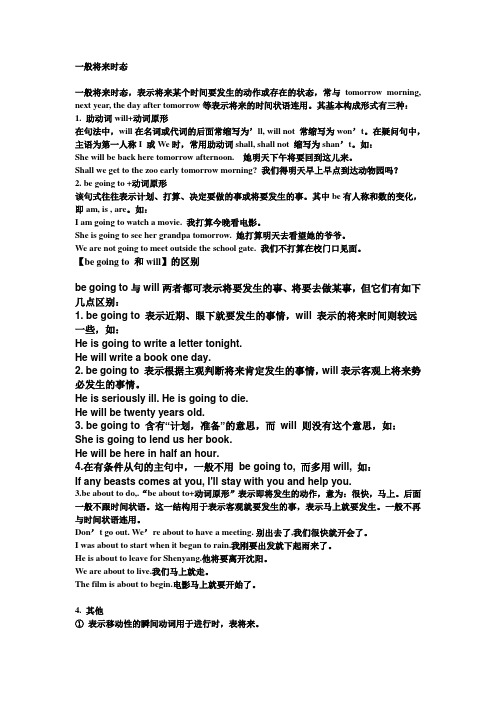
一般将来时态一般将来时态,表示将来某个时间要发生的动作或存在的状态,常与tomorrow morning, next year, the day after tomorrow等表示将来的时间状语连用。
其基本构成形式有三种:1. 助动词will+动词原形在句法中,will在名词或代词的后面常缩写为’ll, will not 常缩写为won’t。
在疑问句中,主语为第一人称I 或We时,常用助动词shall, shall not 缩写为shan’t。
如:She will be back here tomorrow afternoon. 她明天下午将要回到这儿来。
Shall we get to the zoo early tomorrow morning? 我们得明天早上早点到达动物园吗?2. be going to +动词原形该句式往往表示计划、打算、决定要做的事或将要发生的事。
其中be有人称和数的变化,即am, is , are。
如:I am going to watch a movie. 我打算今晚看电影。
She is going to see her grandpa tomorrow. 她打算明天去看望她的爷爷。
We are not going to meet outside the school gate. 我们不打算在校门口见面。
【be going to 和will】的区别be going to与will两者都可表示将要发生的事、将要去做某事,但它们有如下几点区别:1. be going to 表示近期、眼下就要发生的事情,will 表示的将来时间则较远一些,如:He is going to write a letter tonight.He will write a book one day.2. be going to 表示根据主观判断将来肯定发生的事情,will表示客观上将来势必发生的事情。
动词时态一般将来时的用法

动词时态一般将来时的用法动词时态包含了多种不同的形式,每种形式都传达了特定的时间信息。
在英语中,一般将来时是用来表达将来发生的动作、事件或状态的。
本文将详细介绍一般将来时的用法,并提供一些例句来帮助读者更好地理解。
一、一般将来时的定义一般将来时是用来表达明确的将来发生的动作或状态。
通常使用的助动词是will或shall,根据主语的不同而定。
二、一般将来时的构成1. 肯定句结构:主语 + will + 动词原形例如:- I will go shopping tomorrow.- He will travel to Europe next week.2. 否定句结构:主语 + will + not + 动词原形,或主语 + won't + 动词原形例如:- She will not visit her grandparents this weekend.- They won't attend the party.3. 疑问句结构:Will + 主语 + 动词原形?例如:- Will you join us for dinner?- Will they arrive on time?三、一般将来时的用法1. 表达自愿或意愿一般将来时常常用来表达主观上的决定、打算或愿望。
例如:- I will help you with your project.- He will volunteer at the local charity organization.2. 表示未来的计划或安排一般将来时可用于描述预定的时间表或安排。
例如:- We will have a meeting at 9am tomorrow.- They will arrive at the airport in the evening.3. 表示预测或推测有时,我们可以根据现有的证据或情况,使用一般将来时来推测未来可能发生的事情。
“一般将来时”的几种语法形式[整理版]
![“一般将来时”的几种语法形式[整理版]](https://img.taocdn.com/s3/m/6c03bef44bfe04a1b0717fd5360cba1aa8118c39.png)
“一般将来时”的几种语法形式一般将来时的语法形式主要有四种:shall / will +动词原形;be going to +动词原形;现在进行时和一般现在时。
现将这四种形式分述如下:一、shall / will +动词原形1. will可用于所有人称,但shall 仅表示单纯将来时,用于第一人称I和we,作为will的一种替代形式。
以Y ou and I为主语时通常避免用shall。
例如:He will be back soon. 他很快就会回来。
I shall/will be free on Sunday. 星期天我有空。
Y ou and I will work in the same factory. 你和我将在同一工厂工作。
2. will, shall可用来预言将来发生的事。
如说出我们设想会发生的事,或者请对方预言将要发生什么事。
例如:It will rain tomorrow. 明天将要下雨。
3. will, shall除可表示单纯的将来时以外,还可以带有意愿的色彩,仍指的是将来。
例如:I’ll buy you a bicycle for your birthday. 你过生日时,我给你买一辆自行车。
(表示允诺) Will you open the door for me please? 请你帮我开门好吗?(表示请求)Shall I get your coat for you? 我可以为你拿外套吗?(表示提议)二、be going to +动词原形1. 表示说话人根据现在已有的迹象,判断将要或即将发生某种情况。
这类句子的主语可以是人,也可是物。
例如:There is going to be a football match in our school tomorrow afternoon. 明天下午我们学校将有一场足球赛。
(已有告示)I feel terrible. I think I’m going to die. 我感到难受极了,我想我快不行了。
英语一般将来时

英语一般将来时英语一般将来时,又称为未来时态,是用来表示将来会发生的动作、事件或状态的一种时态。
它的构成通常由"will" 或 "be going to" 加上动词原形来表示。
下面将详细介绍英语一般将来时的用法。
一、"will"的用法:1. 表示将来的决心、意图、打算或做出的决定。
例如:I will help you with your homework after dinner.(晚饭后我会帮你做作业。
)2. 表示对将来的预测、推测或猜测。
例如:It will rain tomorrow.(明天会下雨。
)3. 表示对将来的自然趋势、发展或趋势。
例如:Technology will continue to advance in the future.(科技将来会继续发展。
)4. 表示对将来的保证、允诺、请求或建议。
例如:I promise I will be on time for the meeting.(我保证会准时参加会议。
)二、"be going to"的用法:1. 表示对将来已经计划或决定好的事情。
例如:I am going to visit my grandparents this weekend.(这个周末我打算去看望我的祖父母。
)2. 表示对将来可能发生的事情有一种预见或判断。
例如:Look at those dark clouds. It's going to rain.(看那些乌云,将要下雨了。
)3. 表示以现有证据或迹象预测未来。
例如:She's been studying very hard. She's going to pass the exam.(她一直学得很努力,她一定会通过考试的。
)三、注意事项:1. 一般将来时中的时间状语词可以是今天、明天、以后、将来、下个月等表示将来的时间状语词。
英语时态一般将来时

(二)“be going to+动原” 与“现在进行时”
be going to主要表示主观想法或意图, 而现在进行进表示将来强调作出的安排。
比较:
I’m going to wash the car if I have time.
I’m picking you up at 6; don’t forget.
(三)一般将来时的句式转换
1.否定 2.疑问 a.一般疑问
b.特殊疑问
(一) “will / shall+动词原形”
“be going to +动词原形” @1 一般可互换; @2
经过事先考虑好的,则通常要用be going to 说话的当时才临时想到的,则通常用will。
@3
若是有迹象表明要发生某事,通常 只用be going to。
@5一般现在表将来
1.按规定要发生的事或表示事实;
The train leaves at 7:25 this evening. Tomorrow is Wednesday.表将来;
1.There ____ a concert on People Square next Monday evening.
@1(be to) @2(be about to) @3(be due to)
三者均表示计划或打算即将要发生的 动作;
但@2一般的用法是表客观即将发生 之事,否定句中才表主语的计划性。
@4现在进行时表将来
现在进行时表将来的动作,谓语 通常为瞬间动词。如: come, go, arrive, leave start, return, stay, meet, get 等。
(二)一般将来时的构成
a.一般将来时的基本构成
@1 will/shall + 动词原形
一般将来时
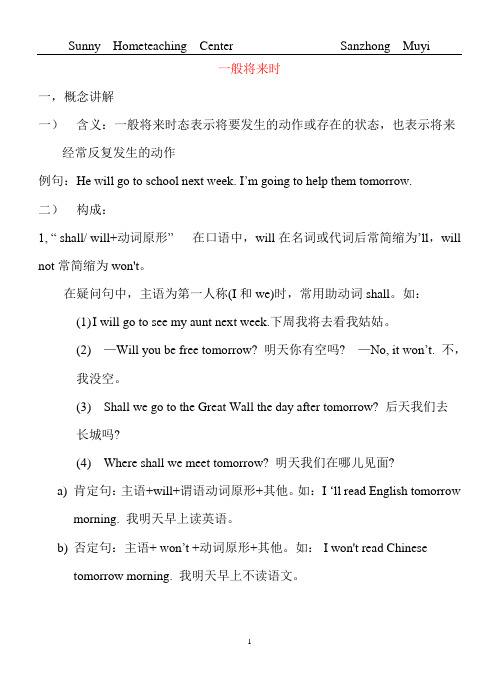
一般将来时一,概念讲解一)含义:一般将来时态表示将要发生的动作或存在的状态,也表示将来经常反复发生的动作例句:He will go to school next week. I‟m going to help them tomorrow.二)构成:1, “ shall/ will+动词原形” 在口语中,will在名词或代词后常简缩为‟ll,will not常简缩为won't。
在疑问句中,主语为第一人称(I和we)时,常用助动词shall。
如:(1)I will go to see my aunt next week.下周我将去看我姑姑。
(2) —Will you be free tomorrow? 明天你有空吗? —No, it won‟t. 不,我没空。
(3) Shall we go to the Great Wall the day after tomorrow? 后天我们去长城吗?(4) Where shall we meet tomorrow? 明天我们在哪儿见面?a)肯定句:主语+will+谓语动词原形+其他。
如:I …ll read English tomorrowmorning. 我明天早上读英语。
b)否定句:主语+ won‟t +动词原形+其他。
如: I won't read Chinesetomorrow morning. 我明天早上不读语文。
c)一般疑问句:助动词will+ 主语+ 动词原形+ 其他+? 如: will you readEnglish tomorrow morning ? Yes, I will./No, I won‟t . 你明天早上读英语吗?是的,我明天早上读英语。
/不是的,我明天早上不读英语。
d)特殊疑问句:特殊疑问词+一般疑问句+? 如:What will you dotomorrow morning ? 你明天早上做什么?2, “be going to + 动词原形”be going to常用来表示打算、计划、决定要做的事情或根据某些现象或征兆预测即将发生的事。
英语时态:一般将来时

英语时态:一般将来时一般将来时(simple future tense)表示将来某一时段的动作或状态,或将来某一段时间内经常的动作或状态。
一般将来时常常和表示将来的时间状语连用。
如:tomorrow, next week, in the future, in a year等。
Ⅰ. 句法结构【仅讨论陈述句和疑问句两种语式】:1.陈述句:A. 肯定形式:主语+be going to /will/shall +动词原形+其他B. 否定形式:主语+be not going to /will not/shall not+动词原形+其他注:a. 在直接在助动词后加not。
b. be going to结构中的be仅指am, is, are三个be动词。
c. will/shall+动原结构在谓语两态变化中无人称和数的变化。
d. 一般情况下,仅表示时态时,shall用于第一人称,will用于第二、三人称;表示说话人强烈意愿和语气时则用法相反。
2.疑问句:A. 一般疑问句:助动词提前即可①Be动词+主语+ going to +动词原形+其他②Will/Shall+主语+动词原形+其他B.特殊疑问句:特殊疑问词+一般疑问句(同上)3.被动语态:主语+ 助动词(结构) + be +动词过去分词【被动结构be done,时体现在助动词】➢两态变化例句参考下表(以will为例):Ⅰ. 主要用法及结构:1.【一般将来时表将来】一般将来时表示将要发生的动作或情况。
A.will/shall +动原I will(shall) arrive tomorrow.Will you be free tonight?B.be going to+动原a.表示计划、打算、准备做的事。
We are going to put up a building here.b.表示即将发生或肯定要发生的事。
I think it is going to snow.注:在一般将来时的句子中,有时有表示将来时间的状语,有时没有时间状语,这时要从意思上判断是否指未来的动作或情况。
一般将来时态

as soon as , until, before, as long as等)的复合句中, 从句用一般现在时,主句用将来时,且用will而不 用be going to。如:
• I’m coming. (我就来了。) • Are we all going ? (我们都将去吗?)
四、一般将来时在使用中的一些注意事项:
arrive,begin等动词可用现在进行时表示安排和计划或即 将发生的动作。如:
四、一般将来时在使用中的一些注意事项:
•2.在含有条件状语从句或时间状语从句(if, when,
3.Everyone will have a small car.(对划线部分提问) __ __ everyone __ ?
1.Students will go to school in the future.(一般疑问句)
Will students go __ __
__
to school in the future.
1.Students will go to school in the future.(一般疑问句)
__ __ __ to school in the future.
2.There will be some robots in our homes.(改为否定句)Biblioteka There ____
__ robots in our homes.
不定式的用法
一般将来时态的用法
课堂目标
16种英语时态 一般将来时

16种英语时态一般将来时表示将要发生的动作或存在的状态及打算,计划或准备做1.时间状语:tomorrow.next day.soon.in a few minutes.by·the day after tomorrow2.基本结构:主+am/is./are+going to +do,will/shall+do否定式:am/is/are+not going to+do, will/shall+not do一般疑问句:be+·will/shall+·3.基本用法:[1]a.表示将来时间的动作或状况Eg:they are going to have a competition with us in studies.B.用于真实条件句和时间状语从句的主句中表示将来的情况Eg:i’ll tell you as soon as he comesC.用于条件状语从句表示愿望或意愿Eg:if you will wait for me,i shall come back soonD.表示一种倾向或习惯性动作Eg:the shop won’t openn until nine.[2]a.be going to+v原(表示打算或准备好要做的事或有迹象表明要发生的事情)Eg:what are you going to do during the summer holidayB.be+v-ing 有些v的现在进行时表示将要发生的动作,表示按计划或安排即将发生的事情,如:go come leave start arrive Eg:jenny is coming to supper this evening.C.be to +v原表示约定命令或按计划要做的事情D.be about to +v原表示将要马上Eg:he is about toleave附加:1.be going to ---- be toBe to 表示客观安排或受人指示而做某事Eg:i am to play football tomorrowBe going to 表示主观的打算或计划Eg:i am going to play football tomorrow2.be going to ---- will用于条件句时,be going to 表将来will表意愿eg:if you are going to make a journey,you’d better get ready for it as soon as possibleNow if you will take off your clothes,we will fit the new clothes on you in front of the mirror.。
初中英语语法复习:一般将来时

初中英语语法复习:一般将来时一般将来时表示将来某一时刻的动作或状态,或将来某一段时间内经常的动作或状态。
常与一些表示将来的时间状语连用,如:tomorrow(明天),next week(下周),from now on(从现在开始);in the future(将来),in a few days等。
1、基本结构:be going to+动词原形 2. will+动词原形一般将来时:be going to+动词原形一般将来时:will+动词原形2. will 和be going to 的区别will 和be going to一般可以互用,但有时有区别:1)含时间和条件状语从句,如果主句是将来时,多用will.2)如果不是以人的意愿为转移,将来肯定会发生的动作和状态,多用will3)be going to根据迹象推测,有可能发生的事情或计划要做的事情。
3. there be 句型的一般将来式:1.There is/are going to be 2. There will be一、单项选择1.The old scientist ______ us a talk on future life next week.A.gives B.gave C.will give D.is giving2.—Jim, what are you going to do this weekend?—I ______ a movie with my dad.A.am watching B.watch C.watched D.am going to watch3.—Where’s mum?—She is trying on the new dress upstairs now. She _________ it to a party.A.wears B.wore C.will wear D.is wearing4.—What are you going to do next weekend?—There __________ a basketball match next Sunday. I want to watch it.A.will be B.will have C.is going to have D.are going to be 5.—Which team ________ the football match?—I’m not sure. The two teams both play well. Let’s wait and see.A.wins B.won C.is winning D.will win 6.Robots ________ us do some heavy and difficult jobs in the future.A.help B.helped C.are helping D.will help7.—What are you going to do next weekend, Wang Hui?—I ________ my grandparents next Sunday.A.visit B.visitedC.am visiting D.am going to visit8.I don’t know if it ________ sunny tomorrow. If it ________ sunny, I will go fishing. A.will be; is B.is; will beC.will be; is going to be D.is; is9.We are going to have a farewell party ________.A.now B.every day C.last week D.next Friday 10.There is going to ________ a basketball match tomorrow.A.be B.have C.is D.are11.Look at the dark clouds in the sky. It ________.A.is going to rain B.rained C.raining D.rainy 12.What ________you ________for tomorrow’s party?A.did; wear B.will; wear C.do; going to wear D.do; do13.He ________ busy this week. He ________ free next week.A.is; is B.will; will be C.is; will be14.There are many black clouds in the sky. It ________ soon.A.will rain B.rains C.rained D.is raining 15.It ________ warm in Dalian tomorrow.A.will be B.is C.does16.She will ________ a book about animals after school.A.buys B.buy C.is buy D.going to buy 17.Mike ________ his room yesterday, and he is going to ________ his homework tomorrow. A.cleaned; do B.cleaned; did C.clean; do18.—Our library is bright and beautiful.—Yes. Will you ________ us ________ it?A.shows; to B.show; aroundC.shows; around D.show; to19.Look! There are a lot of clouds in the sky. It is going to _______ soon.A.rains B.rainy C.be raining D.be rainy20.Li Ming ______ a T-shirt tomorrow.A.buys B.bought C.buy D.will buy 21.Sarah and I ______ a film next Sunday. We ______ horses last Sunday.A.am going to see; rode B.are going to see; rode C.will see; ride 22.—What are you going to do this weekend?—_______A.I’m going to visit my grandparents.B.I’m fine.C.I’m watching TV.D.I’m cleaning the room.23.—Peter! What is your plan for this Sunday?—I ________ my grandmother. She is in hospital.A.visit B.am visiting C.am going to visit 24.It’s cloudy all day today, but it ________ tomorrow.A.changes B.changed C.will change D.is changing 25.—Can your sister ________?—No, she can’t. But she ________ to swim next month.A.swims; is learning B.swim; is learningC.swims; is going to learn D.swim; is going to learn26.—When ________ you come back from London, Mary?—Last week. The River Thames is really beautiful and I ________ it again.A.do; visit B.did; visit C.do; am visiting D.did; will visit 27.This is our last night in China. We ________ home tomorrow.A.will fly B.fly C.flies D.flew 28.—Schools ________ different in the future.—Yes, you are right.A.is B.are C.were D.will be 29.—Why are you in a hurry, Cindy?—There ________ a basketball match between Class One and our class at 3 o’clock.A.are going to be B.will haveC.is going to have D.will be30.Tony _________ the Great Wall with his classmates next Sunday morning.A.visited B.visits C.will visit D.visit31.There ________ a sports meeting in our school next week.A.was B.were C.are D.is going to be 32.You can borrow this film—surely you _________ watching it.A.enjoy B.enjoyed C.will enjoy D.are enjoying 33.—Why are you in such a hurry, Peter?—I________ a basketball match between Class One and our class in ten minutes.A.join in B.am joining in C.joined in D.am going to join in 34.Robots and machines people do more work in the future.A.help B.will help C.are helping D.helped 35.After this exam, you ________ a wonderful holiday next month. Take it easy!A.have B.has C.had D.will have36.If it ______ rain tomorrow, my family ______ go for a walk in the park.A.isn’t, will B.doesn’t, willC.won’t, will D.won’t be, will37.—It’s hot here.—I ________ and open the window.A.go B.went C.am going D.will go 38.—When ________ Lingling ________ litter with her friend?—Next Saturday morning.A.does; collect B.did; collect C.will; collect D.is; collecting 39.Perhaps we ________ able to connect our minds to the Internet in the future.A.are B.were C.have been D.will be 40.—What’s your plan for the new term?—I ________ English well.A.learn B.learnedC.am learning D.am going to learn41.—Are you free? I’d like you to go to the museum with me.—Sorry, there _______ some important meetings this coming weekend.A.is going to have B.will have C.are going to be D.is going to be 42.There ________ schools in the future. Students will study at home.A.is going to have B.will be C.won’t have D.won’t be 43.—How will students learn then?—They ________ by computers in the classroom.A.studies B.studied C.will study D.is studying 44.—What are you going to do, Betty?—I’m going ________ football this afternoon.A.play B.to play C.played D.playing45.We hope ________ a computer on every student’s desk in the future.A.there is B.there wasC.there will have D.there will be46.—What are you going to do this Sunday?—I ________ a picnic with my parents.A.have B.had C.am having D.am going to have 47.We hope there ________ a war in the world. Everyone can live a happy life.A.will not have B.will be not C.is not going to be D.is not going to have 48.If you interview the estate agent, he ________ you much information about housing. A.gives B.gave C.will give D.is giving 49.—The radio says it ________ rain this afternoon, isn’t it?—No. I think it will be sunny.A.will go to B.is going to C.shall go to D.will be 50.Where __________ you __________ have a meeting tomorrow?A.do; go B.will; go C.are; go D.are; going to二、完成句子51.My mother will be back in an hour. (改为否定句)My mother back in an hour.52.The students will study at home in the future. (改为一般疑问句)the students at home in the future?53.Things will be different in the future. (变为一般疑问句)things in the future?54.There is a football match at the sports hall every day.(用tomorrow改写句子)a football match at the sports hall tomorrow.55.Alice is going to do her homework this afternoon. (改为—般疑问句)Alice her homework this afternoon?56.They are going to take a walk in the park. (就划线部分提问)they to in the park?57.They will meet at the school gate at 7 a.m. on Saturday. (对画线部分提问)they at the school gate?58.I’m going to learn English well because it’s very useful.(对划线部分提问)you going to learn English well?初中英语语法复习:一般将来时答案1.C【详解】句意:下周这位老科学家将给我们做一个关于未来生活的报告。
英语一般将来时语法知识点

英语一般将来时语法知识点
英语一般将来时是表示将来某个时间或某个动作会发生的一种
时态。
在语法上,它通常由will或shall加动词原形构成。
一般将来时的用法:
1. 表示未来肯定要发生的事情,如:
I will go to Beijing next week.
他们将在三天后举行婚礼。
2. 表示根据当前情况预测未来可能发生的事情,如:
The weather will be fine tomorrow.
我相信你将成为一位优秀的医生。
3. 表示做决定或承诺,如:
I will help you with your homework.
我们将会在周末前完成任务。
4. 表示请求或邀请,如:
Will you please pass me the salt?
Would you like to have dinner with me tonight?
需要注意的是,有些动词在一般将来时中会有不同的用法,如:
1. be动词的一般将来时通常使用am, is, are,如:
I am going to the park tomorrow.
2. 动词go和come在表达未来时,常用现在进行时,如:
I am going to the movies tonight.
They are coming to visit us next week.
3. 动词表示意愿、建议、命令等语气时,将来时可以用should,如:
You should take a break and relax.
以上是英语一般将来时的基本语法知识点,希望对大家学习英语有所帮助。
英语三大一般时态之三——将来时

一般将来时英语三大一般时态之三: 一般将来时一、构成一、构成等时间状语连用。
一般将来时表示将来发生的事。
常与tomorrow, next year等时间状语连用。
二、用法二、用法通常有以下七种方式表示将来,注意它们各自的区别。
1、由will 加动词原形构成,当主语是第一人称时,也可以用shall 加动词原形。
如:Telephone me this evening. I’ll be at home. 今晚给我打电话,我会在家。
今晚给我打电话,我会在家。
I’ll (shall/will) do a better job next time. 下次我要干得好些。
下次我要干得好些。
注意:注意:1)will还可用来表示同意或“不能”。
如:Come and see me tomorrow. Yes,I will. 明天来找我。
——好的。
好的。
不会晚的。
一Don’t be late. 一No,I won’t. 别来晚了。
——不会晚的。
The car won’t start. 车开不了啦。
车开不了啦。
Oil and water will not mix. 油和水没法混在一起。
油和水没法混在一起。
2)在“祈使句+and/or+陈述句”句型中,陈述句中只能用will或情态动词加动词原形。
如:Work hard, and you will pass the exam. 努力学习,你就会通过考试。
努力学习,你就会通过考试。
3)在条件句中表示将来不用will,而用一般现在时、be going to(打算) 或be to(为人所控制的动作) 等。
若你见到在条件句中用了will,那will 就是表示“愿意”的情态动词。
如:Let her do that if she will. 如果她愿意,就让她那样做。
如果她愿意,就让她那样做。
2、be going to 加动词原形,表示主语的意图或打算将来做的事。
如:加动词原形,表示主语的意图或打算将来做的事。
英语语法 一般将来时

•
There won’t be only one country.
• 一般疑问句:Will+there+名词+其他成份?
•
Will there be only one country?
•
Yes, there will. / No, there won’t.
What can you see in this picture?
shall Will people still use paper money in 100 years?
(2) 用在状语从句中用一般现在时代ቤተ መጻሕፍቲ ባይዱ将来时。
否定式:shall not = shan’t 表示安排、命令或预定要做的事情。
In three days.
The plane takes off at 10:10.
The plane takes off at 10:10. That is, it’s leaving in ten minutes.
(2) 用在状语从句中用一般现在时代替 将来时。
If you do that again, I’ll hit you.
We will have a trip if it is sunny tomorrow.
• “There be”句型的一般将来时
• 肯 定 句:There will be +名词+其他成份.意 为“将会有……”
• 注意:无论后面加单数名词或复数形式,be都 必须用原形。
•
There will be only one country.
• 否 定 句:There won’t+名词+其他成份.
上一页
时态:一般将来时
英语语法一般将来时讲解
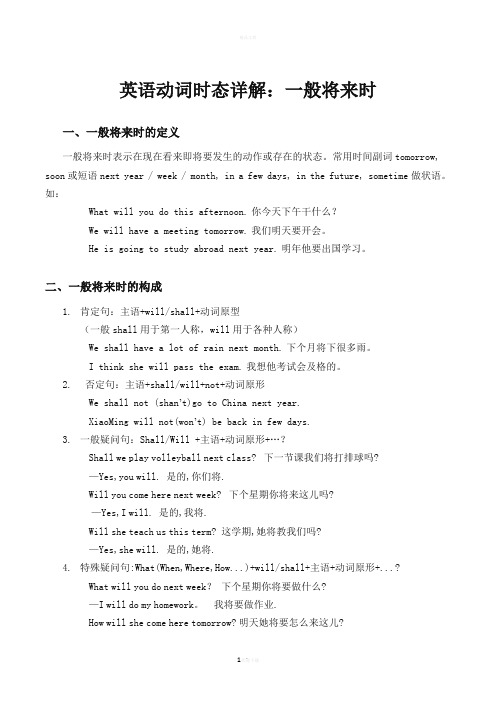
英语动词时态详解:一般将来时一、一般将来时的定义一般将来时表示在现在看来即将要发生的动作或存在的状态。
常用时间副词tomorrow, soon或短语next year / week / month, in a few days, in the future, sometime做状语。
如:What will you do this afternoon.你今天下午干什么?We will have a meeting tomorrow.我们明天要开会。
He is going to study abroad next year.明年他要出国学习。
二、一般将来时的构成1.肯定句:主语+will/shall+动词原型(一般shall用于第一人称,will用于各种人称)We shall have a lot of rain next month.下个月将下很多雨。
I think she will pass the exam.我想他考试会及格的。
2.否定句:主语+shall/will+not+动词原形We shall not (shan’t)go to China next year.XiaoMing will not(won’t) be back in few days.3.一般疑问句:Shall/Will +主语+动词原形+…?Shall we play volleyball next class?下一节课我们将打排球吗?—Yes,you will.是的,你们将.Will you come here next week?下个星期你将来这儿吗?—Yes,I will.是的,我将.Will she teach us this term?这学期,她将教我们吗?—Yes,she will.是的,她将.4.特殊疑问句:What(When,Where,How...)+will/shall+主语+动词原形+...?What will you do next week?下个星期你将要做什么?—I will do my homework。
一般将来时
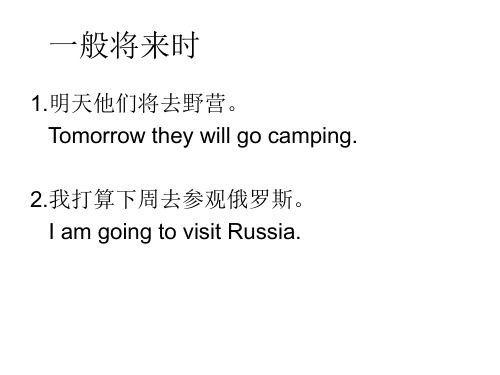
The train __is__c_o_m_i_n_g__soon. 火车一会就来了
专项练习
1.Ihope that you_C_ a good time this evening.
A. have B. are having C. will have D. has
但在现代英语中,特别是在口语中,表示将来时多用“be going to+动词原形”这一形式。
另外他们主要区别在于“be going to+动词原形”表示一个
事先考虑好的意图,相当于“打算、计划、准备”;若表示有某种
迹象要发生某一动作时,要用be going to。
而will则表示未经事先考虑的意图。
e.g. Will there be only one country? Yes, there will. / No, there won’t
附加:
②当主句为一般将来时态时,在if(如果),as soon as (一……就……),when等引导的状语从句中用一般现 在时代替一般将来时。
I ___w_i_ll_c_a_l_l _ you as soon as I___g_e_t_ there.
C.will get toD.ill arrive6.We'll have a trip if it___D______rain.
A.won't B.will C.don't D.doesn't
7.He saves money____B_____he can buy some birthday
presents for his mother.
- 1、下载文档前请自行甄别文档内容的完整性,平台不提供额外的编辑、内容补充、找答案等附加服务。
- 2、"仅部分预览"的文档,不可在线预览部分如存在完整性等问题,可反馈申请退款(可完整预览的文档不适用该条件!)。
- 3、如文档侵犯您的权益,请联系客服反馈,我们会尽快为您处理(人工客服工作时间:9:00-18:30)。
英语时态—一般将来时(The future indefinite tense)讲解与练习参考答案在英语中,每句话都包含一定的时态,要学好英语就必须掌握英语中一些常用的时态。
在英语中,不同时间发生的动作和情况,要用不同的动词形式表示.这种不同的时间和不同的动词形式就叫做动词的时态. 换句话说,判断一个句子的时态,可以通过句子中的时间和动词的形态来判断。
下面我就一般将来时作一些讲解,如有不妥之处,请指教。
每种时态都有三个最基本的要素,分别是该时态的概念、结构、判断标志词。
一、一般将来时的概念:一般将来时表示将来某一时刻的动作或状态,或将来某一段时间内经常的动作或状态。
二、一般将来时的结构:(有两类不同的结构)Ⅰ主语+shall(在英式英语中,只用于第一人称)/ will(在英式英语中,用于第二、三人称) +动词(原形)【美式英语则不管什么人称,一律用will,因此美式英语只有一种结构:主语+ will+动词(原形)】肯定句式:主语+ will + 动词(原形)+ 其它. 【主语+ will = 主语’ll】否定句式:主语+ will + not + 动词(原形)+ 其它. 【will not = won’t】一般疑问句:will + 主语+ 动词(原形)+ 其它?注:英式英语中现在也趋向于所有人称都用will,因此,现在比较少见到I shall或We shall Ⅱ主语+ be going to +动词(原形)+ 其它.肯定句式:主语+ be going to +动词(原形)+ 其它.否定句式:主语+ be + not + going to +动词(原形)+ 其它.一般疑问句:Be + 主语+ going to +动词(原形)+ 其它?注:主语+ be going to + 动词原形‖表示即将发生的或最近打算进行的事。
三、一般将来时的判断标志词tomorrow , the day after tomorrow , next + 时间,in + 一段时间, in + 将来的年代, at once , this afternoon , this evening , soon , in the future , some day , from now on , and so on.四、一般将来时的基本用法1. ①表示将来发生的行为或存在的状态,常与tomorrow; in 2020;next week(year ,month), from now on,soon, some day, the day aftertomorrow,in(the)future, in five days(再过五天), in two weeks(再过二星期)等表示将来的时间状语连用。
Will you be free tonight? 你今晚有空吗?He will arrive here tomorrow morning. 他将于明天早上到达这里。
Don’t worry. I will be back in three days.别担心,我三天之后就回来了②在时间状语和条件状语从句中,表示将来的时候,主句用一般将来时,从句用一般现在时: When it gets warmer the snow will start to melt.当气候变暖时,雪将开始融化。
I will go swimming if it doesn’t rain tomorrow. 如果明天不下雨,我将去游泳。
2. 表示将来的常见方法1)be going to +不定式,表示将来。
①与人连用时往往有―意图、意向、打算、目的在于……‖等含义We are not going to have a picnic. 我们不打算去野炊。
Are you going to buy him a gift? 你打算给他买礼物吗?②根据客观的迹象预示着…I’m going to leave at the end of this week. 我打算在这周末离开。
Look at the clouds, --- there is going to be a storm.看那天上的云,怕是要下雨了。
▲ be going to与will有如下几点区别:①be going to 表示近期、眼下就要发生的事情,will 表示的将来时间则可近可远,如: She told him she was going to quit the job.她告诉他,她即将辞职不干。
He will write a book one day.②be going to 表示根据主观判断将来肯定发生的事情,will表示客观上将来势必发生的事情。
He is seriously ill. He is going to die. 他病得很重。
他就快死了。
Tomorrow will be Wednesday. 明天是星期三。
③be going to 含有―计划,准备‖的意思,而will 则没有这个意思,如:She is going to lend us her book. 他准备把书借给我们。
He will be here in half an hour. 半小时后他将在这里。
④表达意图时:be going to do事先经过考虑的,而will do说话时刻临时想到的;表达预见时:be going to do有客观迹象作基础,而will do说话人的主观想法We’re really lost. I’ll stop and ask someone the way. 我们真的迷路了,我要停下来问路。
I will try my best to help her. 我愿尽力帮助她。
五、一般将来时的特殊用法1)go, come, start, move, sail, leave, arrive, stay、fly等可用进行时态表示将来,常有―意图‖、―安排‖或―打算‖的含义。
它常表示最近或较近的将来,所使用的动词多与移动、方向、启动等有关。
如:They are coming here this afternoon. 他们今天下午来这儿。
Mr. White is leaving for Beijing tomorrow.怀特先生明天将去北京。
▲ 也可用于某些非转移动词。
如:What are you doing next Sunday? 下星期天你打算干什么?My mother is buying me a bike soon. 我妈妈不久将给我买一辆自行车。
I’m meeting you after class. 课后我要找你。
2)come, go, leave, arrive, start, get, stay等动词用一般现在时也可表示将来。
Because the shop is closing down , all the T-shirts are sold at half price. 因为商店就要倒闭了,所有的T恤衫都半价出售The meeting starts at five o'clock. He gets off at the next stop.六、习题操练一、单项选择。
( ) 1. There __________ a meeting tomorrow afternoon.A. will be going toB. will going to beC. is going to beD. will go to be( ) 2. Charlie ________ here next month.A. isn’t workingB. doesn’t workingC. isn’t going to workingD. won’t work( ) 3. He ________ very busy this week, he ________ free next week.A. will be; isB. is; isC. will be; will beD. is; will be( ) 4. There ________ a dolphin show in the zoo tomorrow evening.A. wasB. is going to haveC. will haveD. is going to be( ) 5. –________ you ________ free tomorrow?– No. I ________ free the day after tomorrow.A. Are; going to; willB. Are; going to be; willC. Are; going to; will beD. Are; going to be; will be( ) 6. Mother ________ me a nice present on my next birthday.A. will givesB. will giveC. givesD. give( ) 7. – Shall I buy a cup of tea for you? –________. (不,不要。
)A. No, you won’t.B. No, you aren’t.C. No, please don’t.D. No, please.( ) 8. – Where is the morning paper?– I ________ if for you at once.A. getB. am gettingC. to getD. will get( ) 9. ________ a concert next Saturday?A. There will beB. Will there beC. There can beD. There are( ) 10. If they come, we ________ a meeting.A. haveB. will haveC. hadD. would have( ) 11. He ________ her a beautiful hat on her next birthday.A. givesB. gaveC. will givingD. is going to giving( ) 12. He ________ to us as soon as he gets there.A. writesB. has writtenC. will writeD. wrote( ) 13. He ________ in three days.A. coming backB. came backC. will come backD. is going to coming back( ) 14. If it ________ tomorrow, we’ll go roller-skating.A. isn’t rainB. won’t rainC. doesn’t rainD. doesn’t fine( ) 15. – Will his parents go to see the Terra Cotta Warriors tomorrow?– No, ________ (不去).A. they willn’t.B. they won’t.C. they aren’t.D. they don’t.( ) 16. Who ________ we ________ swimming with tomorrow afternoon?A. will; goB. do; goC. will; goingD. shall; go( ) 17. We ________ the work this way next time.A. doB. will doC. going to doD. will doing( ) 18. Tomorrow he _____ a kite in the open air first, and then______ boating in the park.A. will fly; will goB. will fly; goesC. is going to fly; will goesD. flies; will go( ) 19. The day after tomorrow they ________ a volleyball match.A. will watchingB. watchesC. is watchingD. is going to watch( ) 20. There ________ a birthday party this Sunday.A. shall beB. will beC. shall going to beD. will going to be( ) 21. They ________ an English evening next Sunday.A. are havingB. are going to haveC. will havingD. is going to have( ) 22. ________ you ________ free next Sunday?A. Will; areB. Will; beC. Do; beD. Are; be( ) 23. He ________ there at ten tomorrow morning.A. willB. isC. will beD. be( ) 24. ________ your brother ________ a magazine from the library?A. Are; going to borrowB. Is; going to borrowC. Will; borrowsD. Are; going to borrows( ) 25. – Shall I come again tomorrow afternoon?–________ (好的).A. Y es, pleaseB. Y es, you will.C. No, please.D. No, you won’t.( ) 26. It ________ the year of the horse next year.A. is going to beB. is going toC. will beD. will is( ) 27. ________ open the window?A. Will you pleaseB. Please will youC. Y ou pleaseD. Do you ( ) 28. –Let’s go out to play football, shall we? – OK. I ________.A. will comingB. be going to comeC. comeD. am coming ( ) 29. It ________ us a long time to learn English well.A. takesB. will takeC. spendsD. will spend( ) 30. The train ________ at 11.A. going to arriveB. will be arriveC. is going toD. is arriving( ) 31. There __________ a meeting tomorrow afternoon.A. will be going toB. will going to beC. is going to beD. will go to be( ) 32. Charlie ________ here next month.A. isn’t workingB. doesn’t workingC. isn’t going to workingD. won’t work( ) 33. He ________ very busy this week, he ________ free next week.A. will be; isB. is; isC. will be; will beD. is; will be( ) 34. There ________ a dolphin show in the zoo tomorrow evening.A. wasB. is going to haveC. will haveD. is going to be( ) 35. –________ you ________ free tomorrow?– No. I ________ free the day after tomorrow.A. Are; going to; willB. Are; going to be; willC. Are; going to; will beD. Are; going to be; will be( ) 36. Mother ________ me a nice present on my next birthday.A. will givesB. will giveC. givesD. give( ) 37. – Shall I buy a cup of tea for you?–________. (不,不要。
